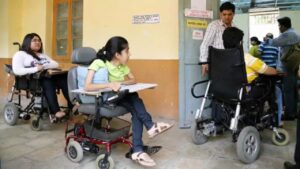Uncontrolled & undiagnosed cases of diabetes can result in organ failure : Dr Purohit

June 28 : National Programme for Prevention and Control of Diabetes Advisor Dr Naresh Purohit on Tuesday said that uncontrolled and undiagnosed cases of diabetes can result in many complications, including organ failure.
He said there are more than 3.5 crore undiagnosed diabetes cases in India and it has affected millions of people in the world and the number is growing exponentially.
Voicing his concern on the alarming rise in diabetic population in the country, Noted Epidemiologist Dr Purohit after addressing a Continuing Medical Education (CME) programme on the occasion of World Diabetes Awareness Day organised by the Vijayawada based Dr YSR University of Health Sciences, told that the prevalence of diabetes in India is 11.4 per cent, while 35.5 percent and 15.3 per cent of people suffer from hypertension and prediabetes respectively, according to the recent findings of a nationwide survey published in the Lancet Diabetes and Endocrinology Journal.
He said that among the states, Goa (26.4 per cent) had the highest prevalence of diabetes while Uttar Pradesh (4.8 per cent) had the lowest.
“Nation-wide epidemiological study on diabetes and Non-Communicable Diseases (NCD) estimates that in 2021, there were 101 million people with diabetes in India, 136 million with prediabetes, and 315 million had high blood pressure,” Dr Purohit said.

The renowned physician pointed out that the major reasons responsible for increasing the incidence of diabetes include genetics and an unhealthy diet, however, he said it’s more of a lifestyle disease.
The noted Epidemiologist said lack of exercise and consumption of fast food accelerates the ailment and most of the time, it goes undetected, especially in rural areas, due to lack of awareness.
He averred that according to a study by the Indian Council of Medical Research–India, the prevalence of diabetes is almost double in urban areas 11.2 as compared to rural areas 5.2. This is despite the fact the medical facilities are better in the cities.
Dr Purohit said that the government has a major role to play in this regard and should invest more in improving the health infrastructure in rural hospitals and ensure availability of adequate staff and medicines.
“With certain lifestyle changes, a diabetic person can live a healthy life. Diabetics should check their blood sugar level at least every four weeks along with having an appropriate diet. A combination of healthy diet and exercise can help in managing the disease successfully.” he emphasized.
Experts in the CME said that apart from improving the overall structure in the rural areas, the need of the hour is raising awareness against this dreaded disease.
The government in association with NGOs and private institutions should carry out awareness campaigns to tackle it. These programmes should cover all essential points about risk factors, various causes and the complications, the experts said.
“Apart from this, more initiatives should be taken by the government to combat the disease. These include improving accessibility of healthy foods to the masses, availability of medicines at low rates, ” they added.
“The doctors should also recommend HbA1c tests to identify pre-diabetic patients and guide them to make lifestyle changes to manage the disease.”
“Regular exercise is highly recommended as moderate to vigorous activity can help control the disease besides daily consumption of vegetables, fruits, whole grains and healthy fats, weekly intake of fish, poultry, beans and eggs, moderate portions of dairy products and Limited intake of red meat,” the experts stressed.










